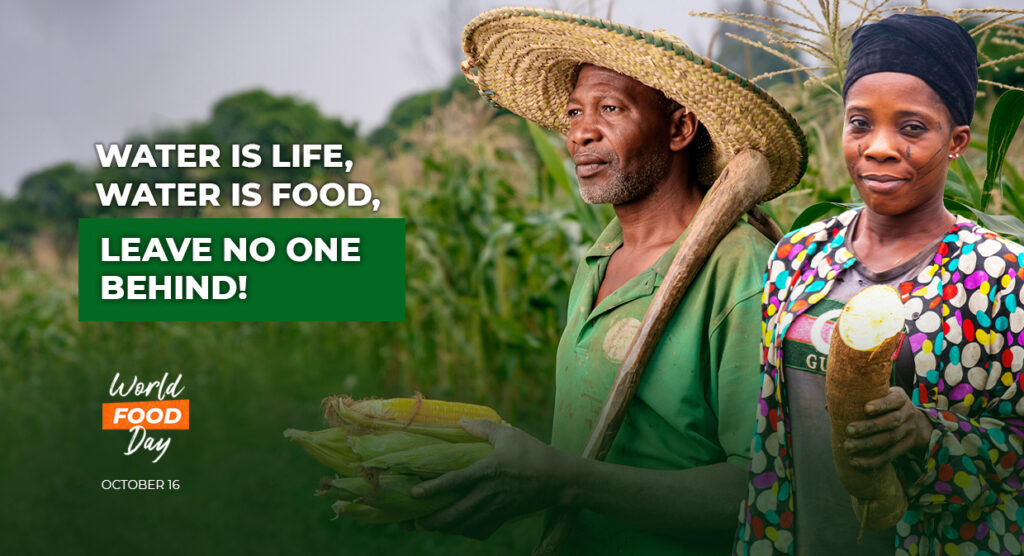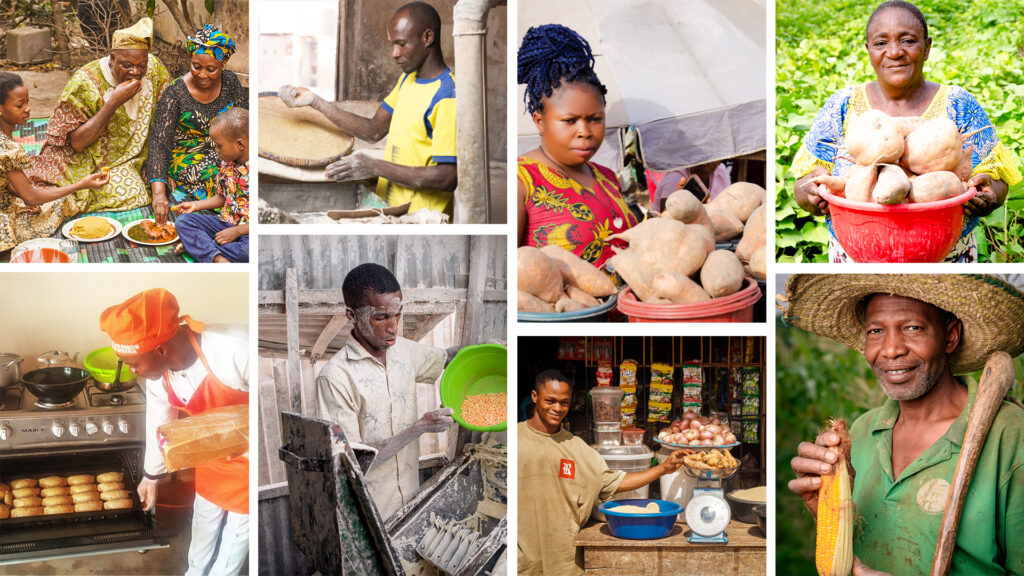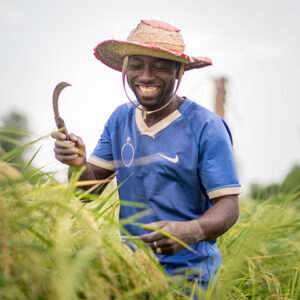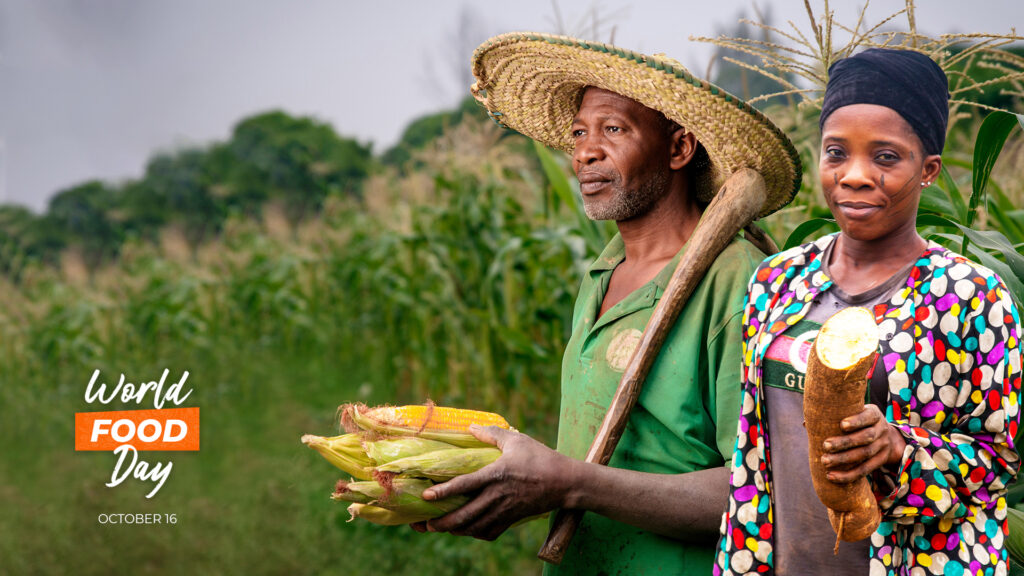Encouraging farmers, and workers to eat, produce nutrient-enriched staple foods

Malnutrition is an agelong health, social and economic problem, not only in Nigeria, but in Sub-Saharan Africa and the world at large. While it has different manifestations, including wasting, stunting and underweight in children, and underweight and obesity in adults, it is further worsened by the menacing crisis of food and nutrition insecurity.
According to the United Nations Children’s Fund (UNICEF), nearly 25 million Nigerians will be at high risk of food insecurity if urgent action is not taken.
However, when the issue of malnutrition is discussed among stakeholders, what readily comes to mind is how prevalent it is across the country, especially how it affects the growth and wellbeing of children. Over the years, a lot of lifesaving interventions have been targeted towards ensuring that households, particularly women and children, have unhindered access to qualitative, nutritious, and affordable foods.
While Nigeria has made some progress in this regard, one very important tap that is left open, which can quickly erode the gains made over the years is the inadequate attention to support for farmers, farm workers and their households. While food security and nutrition for the entire populace matter, that of farmers and their households should matter as well.
The Centre for Communication and Social Impact (CCSI) believes that if efforts support for farmers and SMEs are ramped up, Nigeria will be able to achieve food security and improved nutrition, as well as promote sustainable agriculture, in accordance with the Sustainable Development Goal 2 (SDG2).
This year, Nigeria joins the rest of the world to commemorate the World Food Day with the theme: “Water is Life, Water is Food, Leave No One Behind.” While stakeholders in the agricultural sector, particularly farmers and farm business owners, are urged to use water judiciously by eschewing waste due to environmental and human activities, there is an urgent need to strengthen and improve food security and nutrition through improved diets for farmers, farm workers, other workers in businesses in the food value chain, and among the wider population in the country.
The Global Alliance for Improved Nutrition (GAIN) engaged CCSI to implement a Social and Behaviour Change (SBC) campaign for its Strengthening Nutrition in Priority Staples (SNiPS) project, aimed at increasing demand for nutrient-enriched priority staple crops (cassava, maize, rice, and orange-fleshed sweet potato) in four selected Local Government Areas (LGAs) across four states. The states include: Benue (Gboko, Otukpo, Gwer-East and Makurdi LGAs), Kaduna (Lere, Giwa, Chikun and Kauru LGAs), Nasarawa (Doma, Lafia, Awe and Kokona LGAs, and Oyo (Afijio, Iseyin, Ido, and Oyo-West LGAs).
The SNiPs project works through three main workstreams of biofortification, business support and workforce nutrition.
Biofortification simply means improving the production and consumption of more nutrient-enriched crops, and nutritious foods by farmers, farmer workers and their households. Workforce nutrition focuses attention on improving diets for workers, farmers and their families. Business support ensures that farmers and Small and Medium Enterprises (SMEs) in the food value chain produce more nutritious and safe foods that are accessible, affordable, and desirable.
CCSI’s support in Benue State, focused on Orange Fleshed Sweet Potato (OFSP) and rice; Kaduna State, maize; Nasarawa State, rice; and Oyo State, OFSP and Vitamin A Cassava (VAC) value chains.
The first phase of the SBC project which ran from February to August this year, surpassed its projected milestone of 10,000 persons to be reached. The community level activities conducted by Community Volunteers (CVs), and supervised by CCSI state-based SBC consultants, reached a total of 13,563 people across the 16 LGAs in focus.
The implementation of the project leveraged community activities – compound meetings, community dialogues, association meetings and farm visits – to deliver tailored messages to the communities. Community leaders were very instrumental to the success of the project, as they helped to mobilize and prime residents about the activities.
Although the SNiPS SBC campaign had the tagline: Produce Right, Eat Right, Live Healthy, the bottomline was to promote and cause behaviour change by encouraging farmers, farm workers, and business owners to plant biofortified crops/vines/seeds and stems, consume locally nutritious foods, consume biofortified crop, process biofortified crops, sell crops under hygienic conditions, and buy/sell biofortified raw staples.

For each of the project’s worksreams, customized messages were carefully crafted to educate the people about how they can produce and regularly consume nutrient-enriched foods to keep themselves and their family healthy, while making profit.
Farmers were also encouraged to visit designated sites to get quality planting materials at reasonable and affordable prices.

The vision for the SNiPS project is to ensure that by December 2025, farmers and their households, farm workers and business owners in the agriculture and food value chain have adequate knowledge, correct skills, and confidence to access, produce and consume nutritious foods including nutrient-enriched staples for increased productivity and improved nutrition.
Beyond the numbers of people reached, which is impressive, the success stories of the people behind the numbers are a testament to the far-reaching impact of the project.
Among those whose personal and financial lives have been impacted by the project is Priscilla lorliam. The 32-year-old farmer has been able to find both purpose and profit by farming red potatoes, which is a food item that is highly recommended for people suffering from diabetes.
The Tse-poor Makurdi-born farmer said, “I have been hearing about ‘atsaka u nyian’, the red potato which you refer to as OFSP. They said it is potato for people who have diabetes. I am happy to learn that it is food for everybody. I am happy to know that it can be used for my food and there is a market for it. I will be glad to plant this OFSP too so that I can increase my income.”
Another beneficiary, Antsar Bridget, after participating in the SNiPS Community Volunteer training decided to go into OFSP farming. The 35-year-old Community Volunteer and farmer said, “I am fascinated by the health benefits of OFSP. I also want to do business with it. That is why I took the decision to cultivate it after I learnt about the crop.”
According to CCSI’s Senior Programme Officer, Kanayo Precious Omonoju, “Farmers, and farm workers are a very critical resource in the food value chain, because they are the first link in food cultivation. In the absence of farmers, food will never be planted and harvested. Farmers and farm workers are encouraged to produce nutritious and safe foods which are accessible, affordable and desirable for improved health and productivity.”
As we join the world to commemorate this year’s World Food Day, let us remember the farmers, farm workers and their households, and the need for them to consume and produce nutrient-enriched crops, which will keep them healthy and lead to economic prosperity for them and the country.
The SNiPS project details within the article were culled from the End of Project Report: SBC Implementation on the Strengthening Nutrition in Priority Staples Project by Kanayo Precious Omonoju.
_____________________________________________________________________________________
About Us
The Centre for Communication and Social Impact (CCSI) is a leading Social and Behaviour Change (SBC) organization with expertise in utilizing evidence from research to implement effective strategies that address barriers preventing designated audiences from adopting recommended behaviours.
Birthed by the Johns Hopkins Center for Communication Programs (JHCCP), Baltimore, USA, and registered in 2001 as a Non-Governmental Organization with the Corporate Affairs Commission of Nigeria, CCSI continues to work towards being the center of excellence in strategic communications in Africa.
Driven by values of integrity, passion, care, innovation, and excellence, CCSI focuses on the central role of strategic communication to impact behaviours, build brands, and provide technical leadership in health and social development.
